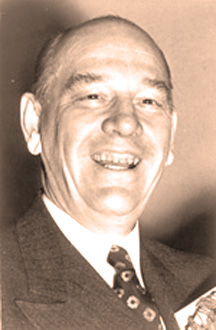 Minnesota’s Norma Lundeen, widow of the Farmer-Labor Party’s Ernest Lundeen, an isolationist who was later accused of being a Nazi sympathizer, unexpectedly entered the race for her late husband’s U.S. Senate seat on this day in 1942.
Minnesota’s Norma Lundeen, widow of the Farmer-Labor Party’s Ernest Lundeen, an isolationist who was later accused of being a Nazi sympathizer, unexpectedly entered the race for her late husband’s U.S. Senate seat on this day in 1942.
Lundeen’s husband, who had been tragically killed in a plane crash near the foothills of the Blue Ridge Mountains in Virginia two years earlier, was reportedly under investigation by the FBI at the time of his death.
Lundeen’s candidacy had as much or more to do with clearing her husband’s name than in actually winning his Senate seat.
Declaring her candidacy shortly before the state’s filing deadline, Lundeen’s last-minute entry created a three-way race for the Farmer-Labor Party’s U.S. Senate nomination, forcing former Gov. Elmer A. Benson, a vehement left-winger who was heavily favored to win the primary, to fend off challenges from two unapologetic nationalists in what amounted to the party’s “last hurrah.” (One of the most successful third parties in American history, Minnesota’s Farmer-Labor Party merged with the Democrats in the spring of 1944.)
All eyes were briefly on Lundeen. Pitted against the popular Benson and ex-Farmer-Labor congressman Henry M. Arens, a 70-year-old former lieutenant governor with deep ties to the state’s farm cooperative movement, many observers believed that the Lundeen name still possessed some magic in Minnesota Farmer-Labor circles, especially among the state’s large German-American population.
The charming 46-year-old widow waged a relatively low-key campaign, quietly yet passionately defending her late husband’s record and promising an all-out prosecution of the war, all the while presciently warning the voters of Minnesota that the internationalists — including the Farmer-Labor Party’s own Elmer Benson — would keep American troops in Europe, Africa and Asia following the war, thereby making the United States the policemen of the world.
“When this war is over,” she asserted on the campaign trail, “we must insist that our sons be returned to America.” If the internationalists prevailed, she cautioned repeatedly, the United States would soon find itself entangled in “continuous intrigue” around the globe, one in which the American people would eventually lose control of their own country and find their own children “pushed out of their cradle of liberty.”
Lundeen, who had been active in the America First Committee, was never a serious factor in the primary. By then, the Lundeen name had been too badly tarnished by revelations that her late husband had associated with some fairly seedy characters on the Far Right, the most damaging of which was his longtime association with George Sylvester Viereck, a controversial German-American poet and novelist who was then serving a two-to-six year prison sentence for having worked as a publicist and propagandist for the Nazis following Hitler’s rise to power in Germany.
Viereck, who had actively supported Robert M. La Follette’s insurgent candidacy for the presidency in 1924, had cultivated friendships with several leading isolationist lawmakers, including New York’s Hamilton Fish, Jr., but Senator Lundeen was arguably his closest ally in Congress.
The thick-lipped Viereck, who reportedly earned more than $100,000 singing the praises of Adolf Hitler while excoriating the British, was later indicted by a grand jury shortly after the devastating sneak attack on Pearl Harbor and was subsequently convicted on charges that he had deliberately concealed information when he registered as an agent of a foreign government.
It turned out that Viereck also helped write speeches for several isolationist congressmen, including ghostwriting at least six speeches for Lundeen — all of which came out during his closely-watched trial in early 1942, seven months before the Minnesota primary.
Testifying as a witness for the defense in Viereck’s trial, Norma Lundeen said that she had never heard Viereck utter a single un-American remark. She later made a dramatic plea for justice for her late husband’s memory, but was denied an opportunity to speak directly to the jury.
“People are thinking my husband is on trial,” she pleaded in an anguished voice. “I’m entitled to a little justice.”
During and following the trial, the mainstream media — playing to the war hysteria that swept the country after Pearl Harbor — delighted in dragging the Lundeen name through the mud at every opportunity. It wasn’t surprising, therefore, that TIME Magazine, in a particularly vicious swipe at the late lawmaker, referred to Norma Lundeen shortly before the primary as “the 46-year-old widow of British-hating, German-loving Senator Ernest Lundeen.”
Just as she failed to find justice in the courtroom, the soft-spoken and attractive Lundeen found little fondness and impartiality for her husband’s memory at the ballot box as Benson, still enormously popular among Farmer-Laborites in the Twin Cities and with miners on Minnesota’s Iron Range, easily captured the party’s U.S. Senate nomination, garnering 66,051 votes to Lundeen’s 24,163 and 17,163 for Arens.
Two years after failing to win her late husband’s seat in the U.S. Senate, Lundeen remarried, tying the knot with U.S. Sen. Rufus C. Holman of Oregon in a simple ceremony in Minneapolis during the summer of 1944. Holman, who served on the Senate Military Affairs Committee with Lundeen’s late husband, had been narrowly defeated in a bid for a second term a few months earlier, losing a bitterly-contested Republican primary to the blunt-mannered and outspoken Wayne Morse. Morse had vigorously denounced Holman as a “dangerous isolationist.”
Holman, who never ran for public office again, died in 1959.
Long forgotten, Norman Lundeen Holman — the wife of two U.S. Senators — died in relative obscurity in 1983 at the age of 87.



Follow Us